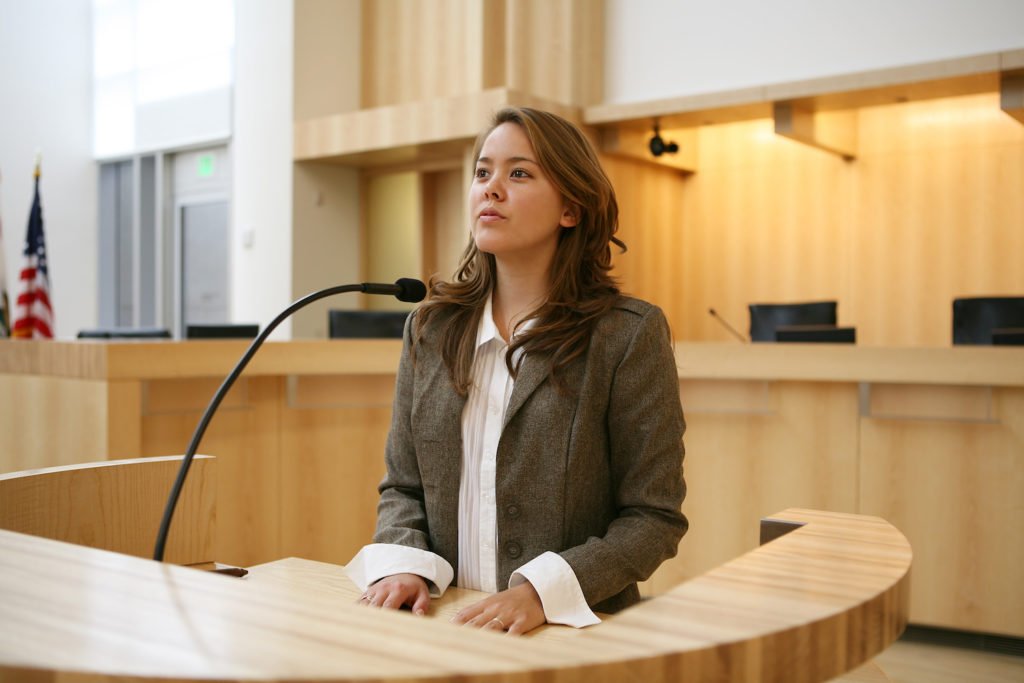CRS 18-8-502 is the Colorado law defining first-degree perjury as lying under oath in an official proceeding. A class 4 felony, 1st-degree perjury carries 2 to 6 years in prison and/or $2,000 to $500,000 in fines. A common defense is that the false statement was not significant enough to be material.
CRS 18-8-502 states:
(1) A person commits perjury in the first degree if in any official proceeding he knowingly makes a materially false statement, which he does not believe to be true, under an oath required or authorized by law.
(2) Knowledge of the materiality of the statement is not an element of this crime, and the defendant’s mistaken belief that his statement was not material is not a defense, although it may be considered by the court in imposing sentence.
(3) Perjury in the first degree is a class 4 felony.
The following table compares the penalties for 1st-degree perjury with those of 2nd-degree perjury and false swearing.
| Colorado Crime |
Classification | Incarceration | Fine |
| First Degree Perjury | Class 4 felony | 2 to 6 years in prison | $2,000 to $500,000 |
| Second Degree Perjury | Class 2 misdemeanor | Up to 120 days in county jail | Up to $750 |
| False Swearing | Petty offense | Up to 10 days in jail | Up to $300 |
In this article, our Denver Colorado criminal defense attorneys discuss:
- 1. What is first-degree perjury in Colorado?
- 2. How is it different from second-degree perjury?
- 3. What are the penalties under CRS 18-8-502?
- 4. How do I fight the case?
- 5. Can immigrants get deported for it?
- 6. Can the criminal record be sealed?
- 7. Related offenses

1st-degree perjury is materially lying under oath in a court proceeding
1. What is first-degree perjury in Colorado?
First-degree perjury is knowingly making a materially false statement at an official proceeding, such as at a trial or a deposition.1 For a lie to qualify as a materially false statement under Colorado perjury law, it must potentially affect the proceeding in a way that benefits the perjurer.2
Example: Betsy is called as a witness in a murder trial. She is a friend of the defendant, so she lies and claims she was the defendant’s alibi on the night of the murder. Since this lie could cause the defendant to be acquitted, this is a material lie. She could therefore be charged with perjury.
2. How is it different from second-degree perjury?
Whereas first-degree perjury in Colorado is lying under oath in an official proceeding, second-degree perjury (CRS 18-8-503) is lying under oath not during an official proceeding for the purpose of misleading a public servant.3
An example of 2nd-degree perjury could be lying on an unemployment application “under penalty of perjury” about trying to find work; this lie could then lead to a public servant in the unemployment office granting the applicant benefits that the applicant is actually ineligible for.
3. What are the penalties under CRS 18-8-502?
First-degree perjury is a class 4 felony in Colorado, carrying:
- 2 to 6 years in Colorado State Prison, and/or
- A fine ranging from $2,000 to $500,0004
Note that 2nd-degree perjury is a class 2 misdemeanor, carrying:
- Up to 120 days in jail, and/or
- A fine of up to $7505

Violating CRS 18-8-502 is a class 4 felony in Colorado.
4. How do I fight the case?
Depending on the available evidence, three potential defenses in 1st-degree perjury cases in Colorado are:
- The defendant did not knowingly lie and genuinely believed he/she told the truth;
- The information the defendant gave was in fact truthful; or
- Any false statement was not important enough to be material.6
As with every criminal charge, prosecutors have the burden to prove perjury allegations beyond a reasonable doubt. If the defense attorney can show prosecutors that their evidence is too holey or unreliable to sustain a conviction, the case could be dropped.
5. Can immigrants be deported for it?
Courts can consider perjury to be a crime involving moral turpitude, which is deportable.7 This is why non-citizens facing a criminal case for lying under oath should hire an attorney to fight to get the charge dismissed. Learn about the criminal defense of immigrants in Colorado.
6. Can the criminal record be sealed?
A conviction for first-degree perjury can be sealed three years after the case closes. But if the charge gets dismissed, then the defendant can ask the court for an immediate record seal.8 Learn how to seal Colorado criminal records.
7. Related offenses
7.1. False swearing
False swearing (CRS 18-8-504) is lying under oath in situations not amounting to perjury. So false swearing would not involve an official proceeding or any intention to mislead a public servant. False swearing is a petty offense, carrying:
- Up to 10 days in county jail, and/or
- Up to $300 in fines9
7.2. False affidavit
Making a false affidavit (CRS 42-2-137) is knowingly making a false statement in relation to a DMV requirement. An example is lying on a driver’s license application. Making a false affidavit is a class 2 misdemeanor traffic offense, carrying:
- 10 to 90 days in jail, and/or
- $150 to $300 in fines10
7.3. False reporting of a crime
False reporting of a crime (CRS 18-8-110) is knowingly giving police incorrect information, such as filing a fake police report. False reporting of a crime can be a misdemeanor or a felony depending on the circumstances of the case.11

Call our criminal law firm for legal advice. Our criminal defense lawyers offer free consultations.
Facing perjury charges? Contact us today. We serve clients throughout Colorado, including Denver, Greeley, Colorado Springs, Arapahoe County, and more. We defend against all types of charges from DUI, domestic violence, and restraining order violations to theft offenses, sexual assault, and controlled substance crimes.
See our related article, What is Colorado’s statute of limitations for perjury?
Legal References
- Colorado Revised Statute 18-8-502.
- CRS 18-5-901.
- CRS 18-8-503. (There is no third-degree perjury in Colorado.)
- CRS 18-8-502.
- CRS 18-8-503. Prior to March 1, 2022, 2nd-degree perjury was a class 1 misdemeanor, carrying 6 to 18 months in jail and/or a fine ranging from $500 to $5,000. SB21-271.
- See People v. Scott, (Colo. 1990) 785 P.2d 931
- 8 USC 1227; 8 USC 1101; see Rivera v. Lynch, (9th Cir. 2016) 816 F.3d 1064.
- CRS 24-72-701-708.
- CRS 18-8-504.
- CRS 42-2-137.
- CRS 18-8-110.
